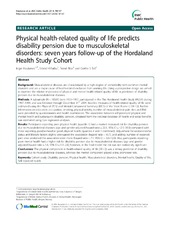Physical health-related quality of life predicts disability pension due to musculoskeletal disorders: seven years follow-up of the Hordaland Health Study Cohort
Peer reviewed, Journal article
Published version
Permanent lenke
https://hdl.handle.net/1956/8994Utgivelsesdato
2014-02-14Metadata
Vis full innførselSamlinger
Originalversjon
https://doi.org/10.1186/1471-2458-14-167Sammendrag
Background: Musculoskeletal diseases are characterized by a high degree of comorbidity with common mental disorders and are a major cause of health-related exclusion from working life. Using a prospective design we aimed to examine the relative importance of physical and mental health-related quality of life as predictors of disability pension due to musculoskeletal diseases. Methods: A subsample (N = 18581) born 1953–1957, participated in the The Hordaland Health Study (HUSK) during 1997–1999, and was followed through December 31st 2004. Baseline measures of health-related quality of life were estimated using the Physical (PCS) and Mental Component Summary (MCS) of the Short Form-12 (SF-12). Further information on education, occupation, smoking, physical activity, number of musculoskeletal pain sites and BMI were provided by questionnaires and health examination. The association between self-perceived physical and mental health and subsequent disability pension, obtained from the national database of health and social benefits was estimated using Cox regression analyses. Results: Participants reporting poor physical health (quartile 1) had a marked increased risk for disability pension due to musculoskeletal diseases (age and gender-adjusted hazard ratio = 22.1, 95% CI = 12.5–39.0) compared with those reporting good/somewhat good physical health (quartiles 4 and 3 combined). Adjustment for socioeconomic status and lifestyle factors slightly attenuated the association (hazard ratio = 16.7), and adding number of reported pain sites weakened the association even more (hazard ratio = 7.1, 95% CI = 3.8–12.8). Also, participants reporting poor mental health had a higher risk for disability pension due to musculoskeletal diseases (age and gender adjusted hazard ratio = 1.8, 95% CI = 1.3–2.6); however, in the final model the risk was not statistically significant. Conclusions: The physical component in health-related quality of life (SF-12) was a strong predictor of disability pension due to musculoskeletal diseases, whereas the mental component played a less prominent role.
Utgiver
BioMed CentralTidsskrift
BMC Public HealthOpphavsrett
Copyright 2014 Haukenes et al.; licensee BioMed Central LtdBeslektede innførsler
Viser innførsler beslektet ved tittel, forfatter og emneord.
-
Attributes and consequences of health information systems data for antenatal care : Health status, health system performance and policy
Venkateswaran, Mahima (Doctoral thesis, 2019-11-05)Background: A routine health information system (RHIS) serves as an important source of data for monitoring health of clients and health system performance. All countries use RHIS data for some form of priority setting; ... -
A Critical Perspective on Mental Health News in Six European Countries: How Are “Mental Health/Illness” and “Mental Health Literacy” Rhetorically Constructed?
Van Beveren, Laura; Rutten, Kris; Hensing, Gunnel; Spyridoula, Ntani; Schønning, Viktor; Axelsson, Malin; Bockting, Claudi; Buysse, Ann; de Neve, Ine; Desmet, Mattias; Dewaele, Alexis; Giovazolias, Theodoros; Hannon, Dewi; Kafetsios, Konstantinos; Meganck, Reitske; Øverland, Simon Nygaard; Triliva, Sofia; Vandamme, Joke (Journal article; Peer reviewed, 2020)In this study, we aim to contribute to the field of critical health communication research by examining how notions of mental health and illness are discursively constructed in newspapers and magazines in six European ... -
Health managers’ views on the status of national and decentralized health systems for child and adolescent mental health in Uganda: a qualitative study
Akol, Angela; Engebretsen, Ingunn Marie S.; Skylstad, Vilde; Nalugya, Joyce; Ndeezi, Grace; Tumwine, James K. (Peer reviewed; Journal article, 2015-12-08)Background: Robust health systems are required for the promotion of child and adolescent mental health (CAMH). In low and middle income countries such as Uganda neuropsychiatric illness in childhood and adolescence represent ...

